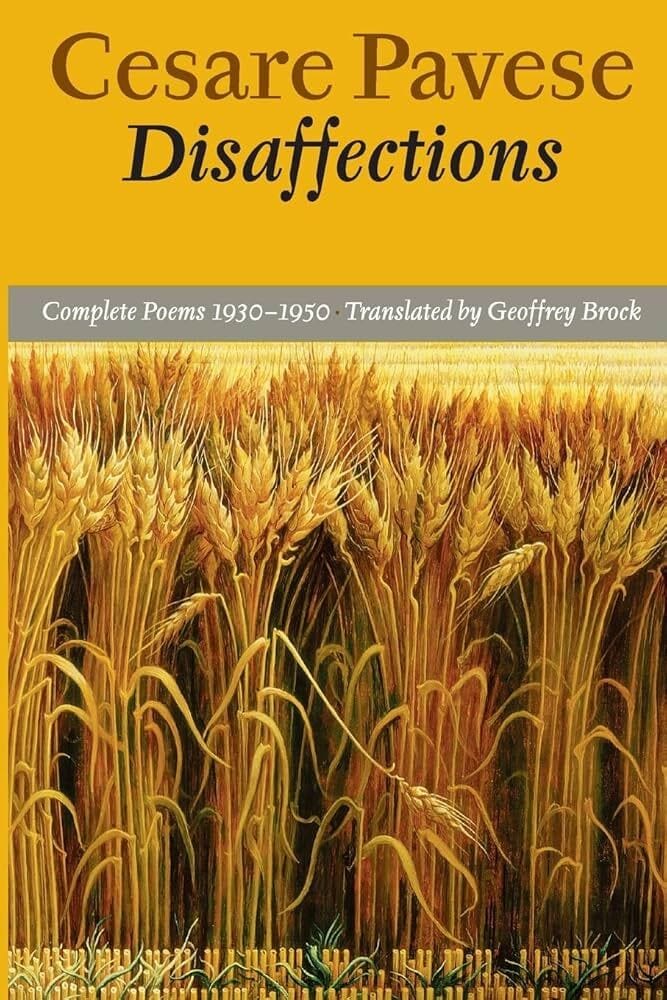
Some people are more well known for how they died. In 1950, after winning the Strega Prize, Italy’s most coveted literary award, Cesare Pavese holed himself up in a hotel in Turin and swallowed a bottle of pills. He left a note, now famous, “I forgive everyone and ask everyone’s forgiveness. OK? Don’t gossip too much.” I like that touch. Don’t gossip too much. Of course, people gossiped. Gossip is just another form of storytelling. Nobody knew this better than Pavese himself. Suicide gets people talking.
I’ve got a friend who made a pilgrimage to Turin and slept in the room where he died. I’m sure she’s not the only one. Pavese’s translator, Geofrey Brock[1], spelled it out in his introduction to Pavese’s Complete Poems 1930-1950:
Though the note was brief, the timing speaks volumes about how little professional success sometimes matters in the face of personal unhappiness.
How often we forget this. In any case, I read Pavese not because of how he died, but because of what he left behind: novels, stories, poems, essays, and a posthumously published journal. Lately, it’s his poems I’ve been returning to. I can never really explain what compels me, after years, to pull a book off the shelf and carry it around with me. But I think it has something to do with how he closes the gap so quickly. It takes one or two lines, and we come to know his people intimately.
Pavese himself was a translator, by all accounts a very good one (he brought Moby Dick to Italian readers) and heavily influenced by American writers (Melville, Edgar Lee Masters, Whitman, Anderson). He developed, as Brock explains in his introduction, the idea of the “story poem.” He conceived of his poems as stories in verse.
As someone who values compression, Pavese often reminds me just how compressed a narrative can be and still knock you clear over. His first book, Work’s Tiring (1936) was followed by his second Work’s Tiring (1943). This title is also the title of a number of poems. You got to love a guy who refuses to give up a good title. Pavese: the great Italian poet of tiredness. He understood something fundamental about not only work, but life, yes it’s tiring, but somehow this tiredness also gives life to the stories we tell and tell.
I had a teacher once in college who said, “Write when you’re tired.” I’ve never forgotten that. I think she and Pavese were on the same wave length in understanding that tiredness, bone tiredness, brings an unusually acute sense of clarity. Pavese’s people often live in the hills above Turin, and very often they are poor, barely clinging to what they have. One poem I return to often is called “Landowners” and it’s about a priest who often prays over the dying and the dead. One late afternoon, the priest buries his own mother. In Brock’s beautifully understated translation, a part of it goes like this:
That day my priest wore the same stole he wore
to his other funerals, but over the coffin
he sprinkled more holy water, and he prayed longer, too.
Another well placed too. There are many other poems in “Complete Poems” similar to this—but never the same. Pavese knew, maybe as well as few writers ever have, that there are as many kinds of lonelinesses as there are people.
Peter Orner is a novelist, story writer, and essayist—as well as chair of the English and Creative Writing department at Dartmouth. His most recent book, Still No Word from You, was a finalist for the PEN/Diamonstein-Spielvogel Award for the Art of the Essay. He is a volunteer with the Norwich Fire Department.
[Editor’s note: fI you or someone you know is in crisis, call or text 988 for the Suicide and Crisis Lifeline. Counselors are on hand anytime, day or night.]
[1] Pavese was also translated by others including William Arrowsmith who, like Brock, was an outstanding translator.
